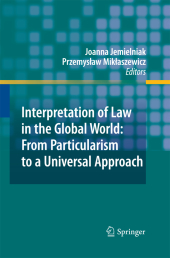 Neuerscheinungen 2014Stand: 2020-02-01 |
Schnellsuche
ISBN/Stichwort/Autor
|
Herderstraße 10
10625 Berlin
Tel.: 030 315 714 16
Fax 030 315 714 14
info@buchspektrum.de |

Joanna Jemielniak, Przemyslaw Miklaszewicz
(Beteiligte)
Interpretation of Law in the Global World: From Particularism to a Universal Approach
Herausgegeben von Jemielniak, Joanna; Miklaszewicz, Przemyslaw
2010. 2014. xiv, 378 S. 235 mm
Verlag/Jahr: SPRINGER, BERLIN; SPRINGER BERLIN HEIDELBERG 2014
ISBN: 3-642-43956-X (364243956X)
Neue ISBN: 978-3-642-43956-8 (9783642439568)
Preis und Lieferzeit: Bitte klicken
Capturing the Change: Universalising Tendencies in Legal Interpretation Joanna Jemielniak and Przemys aw Mik aszewicz International and supranational integration on the European continent, as well as the harmonisation of the rules of international trade and the accompanying dev- opment and global popularity of the resolution of commercial disputes through arbitration, constantly exerts a considerable in uence on modern legal systems. The sources of each of these phenomena are different, and their action is dissimilar. Each can be described as reaching either from the top to the bottom, through the direct involvement of interested States and consequently affecting their internal legal s- tems (international and supranational integration; harmonisation of trade regulations through public international law instruments), or bottom-up, as a result of activity by private parties, leading to the achievement of uniform practices and standards (ar- tration, lex mercatoria). Nonetheless, they both enrich national legal cultures and contribute to transgressing the limits of national (local) particularisms in creating, interpreting and applying the law. The aim of this book is to demonstrate how these processes have in uenced the interpretation of law, how they have shaped the methods and techniques of the interpretation and with what consequences for the outcomes of the interpretative procedures. In assessing the extent of this in uence, due regard must be paid to the fact that the interpretation of law is not, in principle, directly determined by the provisions of law itself.
Capturing the Change: Universalising Tendencies in Legal Interpretation.- Capturing the Change: Universalising Tendencies in Legal Interpretation.- Legal Theory.- Transformations in Law Interpretation: Towards a Universal Approach - The Phenomenon, Causes and Symptoms.- Discourse Ethics as a Basis of the Application of Law.- Judicial Interpretation of Bilingual and Multilingual Laws: A European and Hong Kong Comparison.- The European Dual Nature: Unity/Fragmentation.- European Law.- The Universalisation of Legal Interpretation.- The Power of National Courts in Interpreting Domestic and EU Law: The Indeterminacy of Choice.- Implementation of European Regulation of the Financial Sector: Consequences for the Consumer Protection.- Joint Competence of the EC and Its Member States as a Source of Divergent Interpretations of the TRIPS Agreement at Community and National Levels.- Some Idealism About Realism. Judging Under Certainty and the Standardization of Adjudication in the EC Law.- European Criminal Law.- Pro-European Interpretation of Criminal Law Vis-à-vis the Constitutional Standards of the European Union Member States.- Linguistic Pluralism and Interpretation of European Law in the Third Pillar, Discussed with Reference to the Example of Article 54 of the Convention Implementing the Schengen Agreement.- Introducing Hermeneutic Methods in Criminal Law Interpretation in Europe.- Private Law.- Fifty Years in Five? The Brazilian Approach to the New York Convention.- Explaining Transnational Rules: Discourses and Material Conditions When Implementing the Swedish Corporate Code of Conduct.- The Translation of Transplanted Rules: The Case of the Swedish Nomination Committee.- Transnational Law, Between Ius Mercatorum and Ius Civile.


